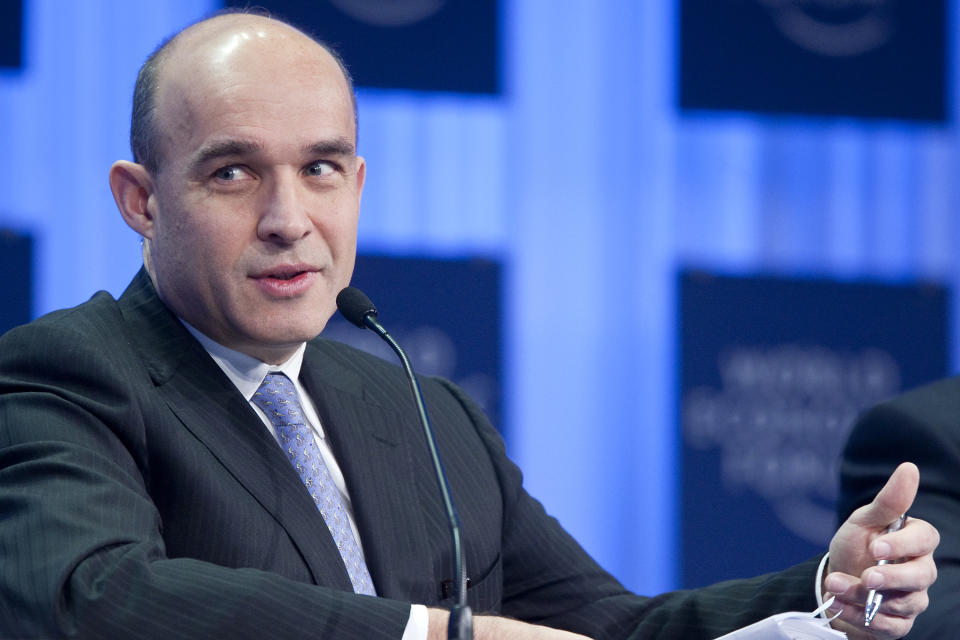Balsillie calls ‘BS’ on Canadian policymakers' lofty innovation claims

Canada is barely putting up a fight in the global war for data supremacy, making friends with the foreign technology giants it ought to be fending off, according to Jim Balsillie, the former chairman and co-CEO of Research In Motion.
His call for more home-grown intellectual property, and limits on the growing influence of global technology firms in this country’s tiny innovation sector, is a familiar refrain for the famed businessman who put Canadian BlackBerry devices (BB.TO) in millions of hands around the world.
Balsillie argues the point has become about more than lost clout.
“Data is the digital nervous system. It’s determinative of not only national security and military power. It’s also determinative of how you manage and control the private sphere within your country,” he told an audience at the Cantech Investment Conference in Toronto on Tuesday. “This is a massive geopolitical war that is framing everything. You have to look at it as all things are on the table with this battle.”
Balsillie’s militaristic comments are underscored by the list of nations that have banned 5G equipment from Huawei Technologies over fear the networking components could be used by China for espionage, an allegation the company denies.
Canada’s problem, he said, is reliance on the likes of Amazon (AMZN), Uber, and Google parent Alphabet Inc. (GOOG) to drive innovation.
“Canada has an innovation problem . . . All our policies are tuned to make the foreign rich richer,” Balsillie said. “Does anybody know what Google’s payroll is in Canada? About $150 million. You know what the revenue is? Several billion. They get the IP free from universities, or near free. They buy small startups and exfiltrate the IP. They get data favourably from Sidewalk Labs.”
Balsillie has complained at length about the data ownership terms of the agreement between Waterfront Toronto and the city-building subsidiary of Google.
“The traditional trade economy, based on comparative advantage, has an incentive to cooperate. Where the ideas economy, because it is rent-based, has landlords and tenants,” Balsillie said. “It’s much more rivalrous.”
The “rent” he refers to is payments for intellectual property, an area were Canada appears to be falling behind global peers. Two-thirds of Canada’s intellectual property on artificial intelligence is owned by foreign firms, Balsillie noted.
He also highlighted reports from the 152-country Patent Cooperation Treaty showing overall filings have grew by 14 per cent between 2014 and 2017.
Filings from Canada shrank by over 22 per cent during that time. Meanwhile, Chinese filings surged 91 per cent.
Canada sat in 22nd place behind Poland on the Bloomberg 2018 Innovation Index. South Korea, Sweden, and Singapore ranked first, second and third respectively.
Ballsillie said he sees examples of “false myths or fake news” in the tech ecosystem, including the claim that Canada is the first country to have a national artificial intelligence strategy.
“Apparently it has already performed beyond our wildest expectations . . . I asked the government to see the documents for this amazing accomplishment. It turns out there are none. This is no strategy,” Balsillie said. “Apparently they are going to work on it.”
His solution to Canada’s innovation woes is for entrepreneurs to reclaim influence over Ottawa’s innovation strategies from non-experts he wishes would shut up. Building bridges between policy makers and tech leaders is the aim of the Council of Canadian Innovators, a business association he chairs.
“Public discourse and policy input is dominated by a plague of people who have no experience commercializing ideas,” Balsillie said. “I try to call out the BS wherever I see it.”
Download the Yahoo Finance app, available for Apple and Android.

 Yahoo Finance
Yahoo Finance 
